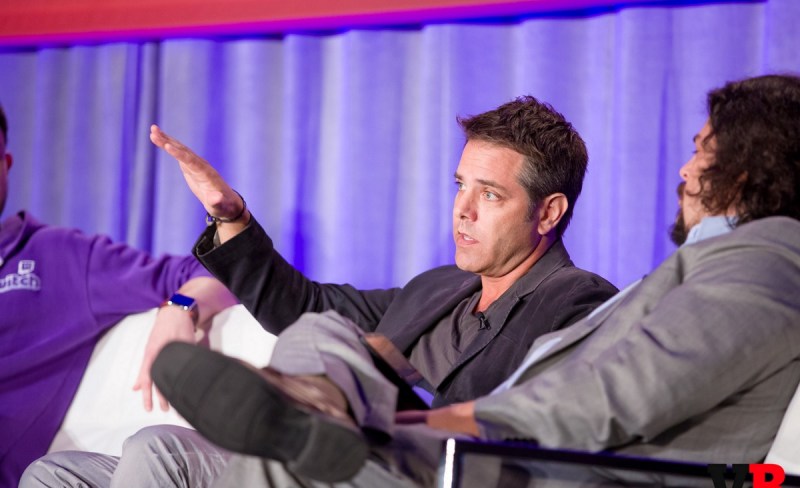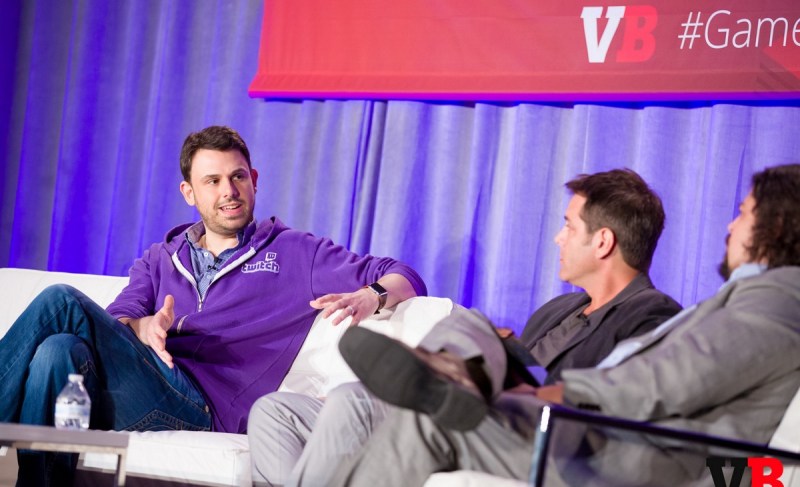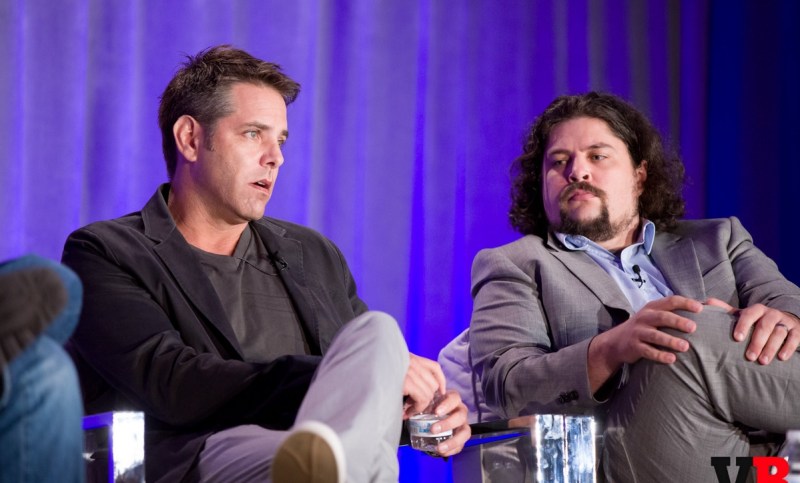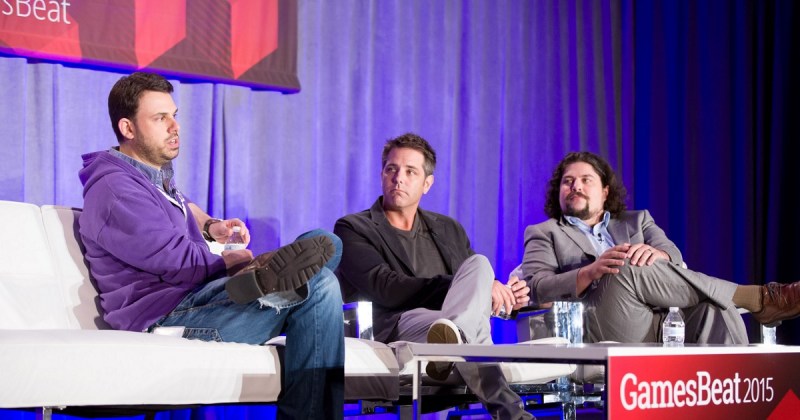Coke’s old slogan was “It’s the real thing.” And that’s a good thing to keep in mind when coming up with promotions and marketing programs that are targeted at gamers.
Balancing authenticity and advertising was the subject of a fireside chat at our recent GamesBeat 2015 conference, where GamesBeat’s Jeff Grubb interviewed Twitch’s Greg Vederman and Coca-Cola”s Matt Wolf on our main stage. They acknowledged that gamers hate fake messages and poor attempts at sending authentic messages to gamers can often make you wince. But that doesn’t mean it’s impossible to draw gamers in.
Coca-Cola staged an event with Twitch last year where they brought four gameplay livestreamers to Coke’s headquarters in Atlanta, where they proceeded to compete against each other in various mystery indie games. The whole event was livestreamed for hours. The results were so good that the companies plan to do it again.
Here’s an edited transcript of their conversation.
AI Weekly
The must-read newsletter for AI and Big Data industry written by Khari Johnson, Kyle Wiggers, and Seth Colaner.
Included with VentureBeat Insider and VentureBeat VIP memberships.
GamesBeat: Please tell us what you do.
Matt Wolf: I’m head of global gaming for the Coca-Cola company and a long-time veteran of the games business. My role at Coke is pretty simple. It’s to use the power of games to help grow our brands and use the power of our brands to shine a positive light on the game sphere. We partner with the industry to create lift.
Greg Vederman: I run custom solutions at Twitch. My team comes up with custom ideas for branded content for any clients that come to us looking to do more than just traditional media, things like display and video.
GamesBeat: When I first talked to these guys about setting up the panel, we weren’t sure what we were going to talk about. Matt got very big on this idea of authenticity. It struck a chord with me. We have a room full of people who are all trying to do different things, but this seems like an idea that can propel everyone. Matt, what does authenticity mean in the game space and why is it so important?
Wolf: For us, and I think in general, creating games today is akin to social media. The two are inextricably linked. Because of that, people are communicating nonstop, whether it’s on free-to-play games and the communities that grow out of that, people talking to each other as they play, or going on to avenues and platforms like Twitch to watch and socialize with each other.
It’s important to be truthful and soulful, really, about the content we create. The people that consume it, our target markets, are smart. They’re savvy. They talk all the time. It can be a very toxic place if you’re not careful, but if you build things that are meaningful, that have value, they’re also incredibly rewarding and loyal.
GamesBeat: Does that echo what Twitch tries to do?
Vederman: Very much so. Authenticity has become a bit of a buzzword, but it really just boils down to being honest and treating your audience with respect. Not trying to mislead them, just telling them exactly what it is that you’re delivering and why it’s awesome for them. Being true to your brand, but also being true to the audience and their passions and their intelligence.
GamesBeat: Twitch is owned by Amazon. Coca-Cola is a huge brand. It seems like it might be a dangerous line to walk. Do you guys see that danger, and how do you avoid it?
Wolf: What we ultimately try to do is create programs and create content that speak for themselves, that people enjoy. When we create it, whether we’re working with partners like Twitch or some of our big gaming partners like Riot Games or Electronic Arts, we go about it at the beginning really ideating and trying to create something that either doesn’t already exists, or if it exists, we feel like we can make it a bit better, a bit more value driven, a bit more meaningful.
Everything we do nowadays is iterative. We create our marketing programs and a lot of our comms programs like we would games. We try to be organic about it. We try to be a bit long-tail about it. We’re not looking at it as if it’s only happening for this time and then it goes away — the campaign’s over and we wash our hands of it. Everything I’m doing at the company around our games programs is designed to have legs and create longevity and continued conversation.
GamesBeat: Greg, have you tried to do something from a place where, “This is for the gamer,” and realized, “Maybe we made a mistake here and we should reevaluate?”
Vederman: It’s a bit different from that. For Twitch, brands come to us looking for help with authenticity. That’s what we have innately, in large part because it’s not us. It’s not our voice, not our authenticity. It’s the community’s. It’s all community-generated content. We just help translate.
We have brands that come to us wanting to try to achieve certain goals. We’ll tell them the best way to do that for the community. On my team we think about it in terms of what’s best for the audience. If the audience is happy then the influencer or the broadcaster is going to be happy, and the brand’s going to get what they’re looking for too.
There are times where you know you have a situation — you go into a creative conversation and you know what the best execution is going to be for that brand, what would resonate the most with the community. For one reason or another you can’t quite the brand there. It’s hard wrapping your head around exactly what Twitch is and what gaming is.
Sometimes we end up in compromises where we’ve put the best ideas we can together, ideas that are going to be awesome, but they’re not necessarily the ideal. We don’t put ourselves in a situation where we’re trying to come up with ideas that we don’t think the community would like. We’re following the community’s lead, looking at what they’re doing, seeing what they like, and putting together concepts and ideas that match their interests.
GamesBeat: Matt, you mentioned the word “toxic” earlier. It feels like, in a certain sense, that the gaming community can be a little scary. Do you feel like that’s what’s motivating this need for authenticity, that gamers can be very loud and demanding?
Wolf: To be fair to everyone, to people, things just generally need to be meaningful, or why are you doing what you’re doing? We make games. We make marketing programs or products, be they CPG, tech, whatever they may be. We have to go about them in a way that’s going to hopefully be meaningful. Bring something that people don’t already have, or bring it in a way that’s better than the way it was.
I’m from the games world for decades. It’s not a scary place. What could make it a little uncertain for companies or big brands coming into the space is just not understanding the intricacies of how games and social are linked, or how communication is transferred between players, or even how these games are played. Not knowing can be a little scary, but the audience itself is great.
You guys were talking about esports on an earlier panel. We activate heavily in the esports sector and have done for a little over two years. It’s been amazing. You go to these events and you see a cross-section of youth — centennial, millennial. It’s amazing to see how passionate these fans are about the sport. There’s nothing scary about them. They’re amazing. They over-index on pretty much everything — socioeconomic, intelligence. A lot of them look like hipsters. When you look at that environment, especially as a brand, you think, “These are people we’d love to reach and be able to bring them something meaningful and start that conversation.” It’s actually really great.
GamesBeat: It sounds like what you’re saying is that it’s an asset that gamers care this much. Maybe that’s what has helped Twitch grow so much?
Vederman: I think so. So long as you’re treating with respect and being honest with them, absolutely. Because they’re so smart and so tech-savvy, they see through BS really fast. They’ve been marketed to badly for a long time, so they come in sort of sensitive.
But within that community, influence really matters — what they see their friends doing. They don’t need to see a story or a review about a product or service, necessarily. They see their friends using a product or service. The friend tells them whether it’s awesome or not. It a really powerful community. You get them on your side by being honest. It’s an incredible resource. You have an amplification for your own messaging.
The key is just making sure that you’re treating them fairly and being honest. We keep saying this over and over again, but they can sniff the BS a mile away.
Wolf: And they’re loud about it. It’s extra amplified online because you have the anonymity of the internet. That’s a powerful thing. In a way it’s almost cultural. People are immediately not worried about just blasting for no good reason. But that’s why it has to be real and meaningful. If it’s not, you can’t go to that place to say, when you’re bringing content to the world, “We believe in this.” Over time, any blasting or trolling that happens early on will eventually go away.
It has to be from the heart. And of course we’re all in the business of building business. That piece also has to work. It’s a dance you do.
GamesBeat: On the other side of that, of having this loud audience, does that also maybe make it more rewarding than other industries? When you do something that is meaningful, you get that feedback.
Wolf: I think it’s cool.
Vederman: It’s crazy. The passion you get back, the energy — one of the things that personally excites me, my background is in games journalism. To this day I still just love creating cool content. To see a brand deliver really cool content in a way that resonates with viewers, and they’re like, “This is incredible,” and it’s brought together by a brand, a brand that made that experience better for them — they weren’t unhappy. You weren’t upsetting them. The brand is going to have all kinds of recognition and retention and affinity. That stuff, when you see it and it’s working, it excites the hell out of me.
GamesBeat: You guys don’t make games personally. You’re involved in the games industry heavily, but the things you’re talking about, do you agree that they’re important for everyone involved in this space?
Wolf: I think so. Whether you’re making a game as a developer — I’ve been in that world in my history, at EA and Sega, before I ever got to Coke. It has to come from a real place. If you don’t love going to the office with your teammates and creating mechanics and building your work, most of the time it won’t reach your consumers. Like Greg was saying, they’ll sniff it out.
There’s no guarantee that if you do pour all your heart into a game, they’ll love it and it’ll be successful. That’s part of the nature of the business as well. It’s entertainment. But I certainly think that at a base line, if you don’t love what you’re doing, if you’re not going there and really loving the craft no matter what side of the business you’re on, it’s probably not going to come through as purely to your end consumer. That’s true for my team and what we do, and I know it’s true for you guys, because we’ve worked together.
Vederman: If the people making the game weren’t authentic about it, if they weren’t throwing themselves into it, if they weren’t making a game that they wanted to play themselves, the performance at retail is going to speak for itself. For myself and certainly for my team, and I know for you and for a lot of people I meet in the industry, we thrive on passion. We do this because we’re excited about it. I’m not very good at doing things I’m not passionate about. It’s my Achilles heel, if you will, but it’s driven me to find my passion in life and my career.
I get excited finding ways to make better creative advertising. Advertising powers the free web. That’s not going to change any time soon. So hat can we do with advertising to make it better, to make it resonate more, to make it not just tolerable, but actually good and fun?
You see a lot of people, whether it’s on my side of the business, your side of the business, or the development side of the business — the people finding success are the ones that are true and honest and passionate.
GamesBeat: I’m wondering what results you may have seen at Coca-Cola that you get when you approach an idea authentically, as opposed to some other campaigns you may have done in the past where you strayed away from that.
Wolf: Everything I’ve done since I’ve been there — we’ve always taken the former approach. I can give you examples of programs that some of you in the audience may not be aware of, but some of the things we’ve done over the last few years that seem to have put us in a unique area.
We partnered with Twitch toward the end of last year to create this program called Game-a-Thon. It had never existed before. It’s a simple idea with some pretty interesting execution. We took four really influential streamers from their network, built a set at Coca-Cola in Atlanta, and streamed for, what, four or five hours?
These casters played five mystery games that they’d never seen before — indie games, games that many of you might never have heard of — and competed against each other for charity. That was a really cool moment. It was fun. We’re going to do it again this year, bigger and better. The feedback from the public was great.
We just partnered with IGN to create eSports Weekly. I agree that it has parabolic lift. We think it’s exciting. There are lots of ways we like to play in that space. eSports Weekly is a weekly news show, something that didn’t exist before. So yes, we’re a brand and our brand is on and around the show, but ultimately what we’re trying to do is give players and fans, the folks who want to celebrate that sport, something they didn’t have before in a very authentic way. We partnered with IGN and they’re great at coverage. It makes a lot of sense.
GamesBeat: Are there any lines some brands might have crossed that you aren’t crossing with these partnerships, ways you make sure things stay real?
Vederman: There are times when a brand will come to us and say, “What do you think is best for us? These are our goals.” We’ll come up with an idea sort of in a vacuum based on that. There are other times when a client or an agency will come to us and maybe they already have an idea. They want us to work with it and figure out the best way to make it work on Twitch. We definitely have conversations along the lines of, “How can we adapt this to make sure it works best? Have you considered cutting out certain elements or amplifying the community interaction in a way that’s going to resonate with our audience?”
We definitely provide the feedback necessary to make sure the content being delivered on Twitch is as strong as possible and the audience is going to like it. Nobody wins if the brand brings something to the platform that the audience just cringes at. They can’t even necessarily articulate it, but you put the wrong thing on screen, the wrong call to action in front of them, and everybody just winces.
Wolf: And then you hear about it.
Vederman: You hear about it a lot. Immediately. Loudly.
VentureBeat's mission is to be a digital town square for technical decision-makers to gain knowledge about transformative enterprise technology and transact. Learn More




